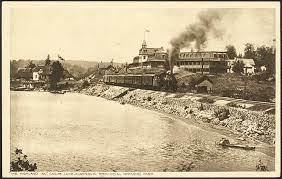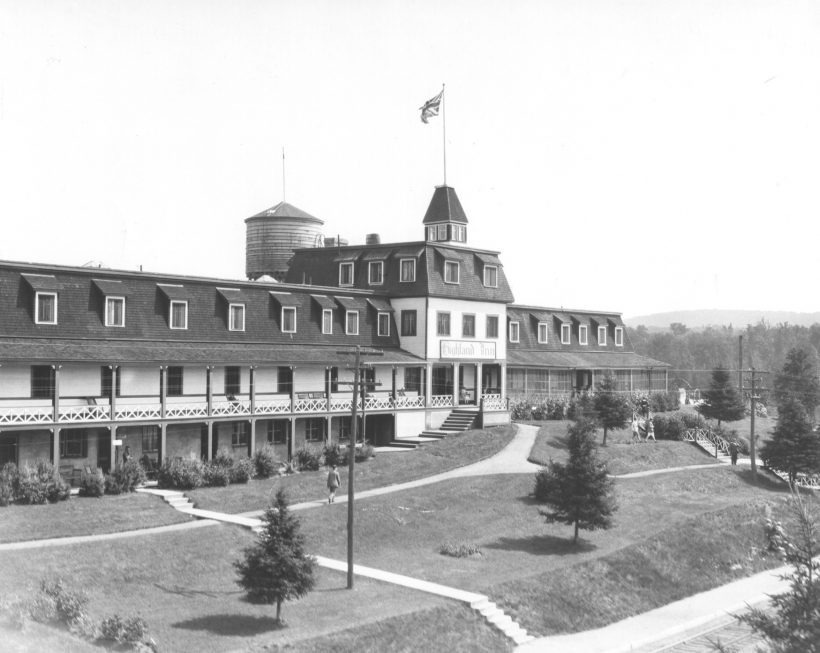ABOUT LOONS by Ralph Bice November 7, 1973
Recently I remarked about young loons being around after the parent birds had headed south. I do know there have been some reports of these juvenile loons being caught in an early freeze up but they are rare. The eggs are usually hatched by the first week of July but they do not mature as fast as gulls or ducks.
Then I got to thinking about an incident of more than fifty years ago. I have been told it is not fair to talk about things that happened so long ago when there is no one around to disagree with you in the facts but I am going to tell about it anyway.
I believe it was the fall of 1922. It had been a lovely fall with hardly a hint of what we usually get in October and November. There was a lot of activity around Cache Lake, then Algonquin Park Headquarters. There were a number of men working for the department and also a few making repairs on the Highland Inn, the then G.T.R. hotel. Most of the birds had gone south but there was a pair of loons easily distinguished as an adult and a young loon that stayed behind. It was the opinion of some of the older woodsmen that the young one was too weak to make the trip to warmer climates. These same old timers, one day late in October, remarked that the weather was about to turn cold and those loons had better take off. They were quite active one morning and then they took to the air. The men watching were a bit surprised in about an hour to see them return and land in the bay close to the buildings. They swam around for a few minutes making loon noises to each other and then the older bird took off. Well the weather prophets were right. It did turn cold that night and the lake just about froze over. There was one spot, out in the narrows, that kept open, and there the little or rather young loon stayed. Some nights only the action of the loon kept a small area from freezing and it got to be quite a game to see in the morning what had happened during the night. Then there was a problem of food. Times the young loon would disappear for what to a human seemed a long time, but always returned to the only open water. Some suggested it should be shot or captured but the ice was not solid enough for a man to cross and after a few days it looked like it could fend for itself.
The cold weather held for about three weeks. There was not much snow but it continued to be cold. Then again the weatherman began making predictions, this time that there would be a thaw. Which happened. It got really mild and in a few days the lake was clear of ice and the young loon again came close to the buildings where everyone had a good look at it and it apparently had suffered no ill effects from its three weeks of very close confinement as far as water was concerned.
There were various ideas of what would happen to the loon but it kept on practising flying, making trips around the lake, but always returning to the bay near the buildings almost as if it wanted all the company it could get.
I should remark that in the many summers I spent on Cache Lake, or at least part of the summers, one could easily see that the loons were not afraid of people. In a canoe you could get within a few feet of them though they did not take so well at the start to motors. So perhaps it felt better when it was close to humans.
One afternoon, and this was told to me by most of the men working there, the young loon got very agitated and started swimming and almost flying in circles as well as making a lot of noise not a bit like loon calls. Then in a few minutes they heard a loon call in the distance. This call was answered by the little loon, there were more calls and then out of the sky came an adult loon and while there was no way to be certain no doubt it was the parent bird. The newcomer landed close to the young bird and again there was a lot of loon talk as the two birds swam around apparently having a happy reunion.
Next morning the two loons were still there, still close to shore, and the talk was what would happen next?
They had not long to see for just about noon the two took off. There were again more calls after the birds were in the air but the last that was seen of them they both were going strong and headed south.

There were loons again on Cache Lake the next summer. No one can be sure if they were the same birds that had nested there for so many summers but since they were the same semi-tame loons no doubt they do return to the same lake. Then there was the speculation if the young loon made it the second try. And too, the amazement that the young loon could hear a loon coming long before human ears could hear its call.
Again, we still only know a little bit of the workings of nature and the birds and animals.
